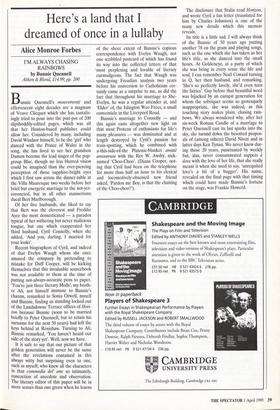Here's a land that I dreamed of once in a
lullaby
Alice Monroe Forbes
I'M ALWAYS CHASING RAINBOWS by Bunnie Quennell Aitken & Blond, £14.99, pp. 200 Bunnie Quennell's mouvemente and effervescent eight decades are a magnum of Veuve Clicquot which she has tantalis- ingly tried to pour into the pint-pot of 200 slipshoddily-edited pages, which was all that her Hoxton-based publisher could allow her. Considered by many, including David Windsor himself, to be the 'girl' who danced with the Prince of Wales in the song, she has lived to see her grandson Damon become the lead singer of the pop- group Blur, though no less blurred vision could be imagined than the ever-piercing perception of those sapphire-bright eyes which I first saw across the dinner-table at the Villa Mauresque two weeks before her brief but energetic marriage to the not-yet- coroneted, but in all other mannerisms ducal Bert Marlborough.
Of her five husbands, she liked to say that Bert was the cleverest and Freddie Ayer the most domesticated — a paradox typical of her withering but never malicious tongue, but one which exasperated her third husband, Cyril Connolly, when she added, 'And you, darling, I married for your looks'.
Recent biographers of Cyril, and indeed of that Evelyn Waugh whom she once amused the company by pretending to mistake for Duff Cooper, will be kicking themselves that this invaluable sourcebook was not available to them at the time of putting not-always-accurate pens to paper. `You're just three literary Molls', my broth- er Ali, not himself immune to Bunnie's charms, remarked to Sonia Orwell, myself and Bunnie, finding us standing locked out of the Landsdowne Terrace offices of Hori- zon because Bunnie (soon to be married briefly to Peter Quennell, but to retain his surname for the next 50 years) had left the keys behind at Renishaw. Turning to Ali, Bunnie remarked, 'You haven't heard our side of the story yet'. Well, now we have.
It is safe to say that our picture of that golden generation will never be the same after the revelations contained in this always witty but surprising even to one, such as myself, who knew all the characters in that commedia del' arte so intimately, concoction of anecdote and observation. The literary editor of this paper will be in more senses than one green when he learns of the sheer extent of Bunnie's copious correspondence with Evelyn Waugh, not one scribbled postcard of which has found its way into the collected letters of that • most perplexing and lovable of literary curmudgeons. The fact that Waugh was undergoing Freudian analysis two years before his conversion to Catholicism cer- tainly came as a surprise to me, as did the fact that throughout his marriage to She- Evelyn, he was a regular attender at, and `Elder' of, the Islington Wee Frees, a small conventicle in the Liverpool Road.
Bunnie's marriage to Connolly — and this again casts altogether new light on that most Protean of enthusiasts for life's many pleasures — was dominated and at length destroyed by Cyril's passion for train-spotting, which he combined with a-this-side-of-the Platonic-blanket amide amoureuse with the Rev W. Awdry, nick- named `Choo-Choo'. (Diana Cooper, not- ing that Cyril had been on the telephone for more than half an hour to his clerical and locomotively-obsessed new friend asked, 'Pardon me Boy, is that the chatting of the Choo-choo?'). The disclosure that Stalin read Horizon, and wrote Cyril a fan letter (translated for him by Charles Johnston) is one of the many new details which this memoir reveals.
Its title is a little sad. I will always think of the Bunnie of 50 years ago putting another 78 on the gram and playing songs, such as the one which she has taken as her life's title, as she danced into the small hours. At Goldeneye, at a party of which she was being in every sense the life and soul, I can remember Noel Coward turning to Q, her then husband, and remarking, `She's so perfectly lovely, she'd even turn the fairies'. Gay before that beautiful word was hijacked by an earnest generation for whom the sobriquet seems so grotesquely inappropriate, she was indeed, as this touching story makes plain, chasing rain- bows. We always wondered why, after her six-week Roman Candle of a marriage to Peter Quennell cast its last sparks into the sky, she turned doWn the besotted propos- als of (among others) David Niven and in latter days Ken Tynan. We never knew dur- ing those 20 years, punctuated by weekly but, alas, never consummated suppers a deux with the love of her life, that she really meant it when she used to say, 'unrequited love's a bit of a bugger'. His name, revealed on the final page with that timing which could have made Bunnie's fortune on the stage, was Frankie Howerd.


























































 Previous page
Previous page